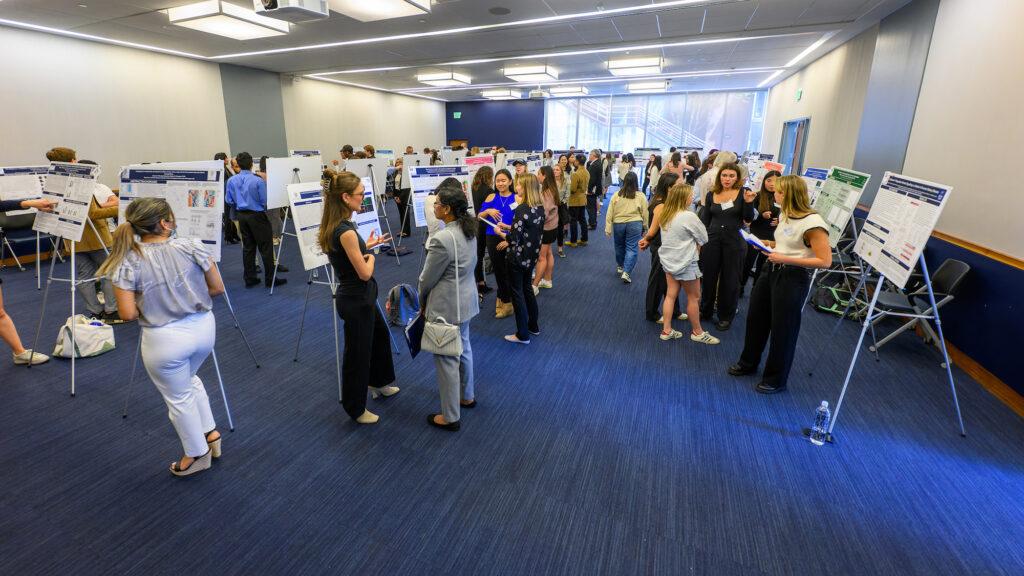Students from several departments across Georgetown University shared their research on a diverse range of topics at the 20th annual the Undergraduate Research Conference (URC) on April 19. During the conference, which was hosted by the School of Health, 92 students presented their research posters, marking a 50% increase in student participation from last year.
The 2023 URC was organized by a student committee chaired by Lizzie Graham (SOH ’23) and Makenzie Thomas (SOH ’24) and overseen by two faculty advisors, Jan LaRocque and Alex Theos. Graham and Thomas chose the keynote speaker for the event, Dr. Leonardo Marino-Ramirez from the National Institute on Minority Health and Health Disparities. The entire student committee interviewed students interested in giving oral presentations and decided the recipient of the mentorship award, which they gave to Dr. Jane Fall-Dickson, an associate professor in the School of Nursing.

According to LaRocque, one of the most rewarding aspects of overseeing the URC has been witnessing its growth in recent years.
“I’ve been involved in this conference over 10 years, and this was the most flawlessly executed conference that I’ve been a part of. And I think that’s particularly exceptional considering the fact that we did have such record numbers of everything,” LaRocque told The Hoya.
The student presenters worked closely with mentors who provided guidance on their research topics. Graham, who is studying how sex and the cell cycle influence DNA repair in LaRocque’s lab, said a lack of prior experience should not dissuade students from approaching faculty mentors.
“Pretty much for all of the primary investigators that I know or have heard about on Georgetown’s campus, it doesn’t really matter what skill set you come in with, because everybody is just so excited to teach you what to do and to help mentor you along the research pathway,” Graham said.
Connor Landers (SOH ’26) was one of two first-year students who presented at the conference, and also one of the recipients of the “Rising Researcher” award. Landers studies how amphetamine could be used to rescue memory consolidation abilities in aged rats in Kenneth Kellar’s lab in the department of pharmacology and physiology. Despite initially feeling nervous about presenting, he said that he found reassurance in his knowledge on the research topic.
“I’m just there having fun, in my opinion, hopefully teaching some people about the cool research that I’ve been doing. So in terms of actual presentation, I felt very comfortable with it,” Landers said.
Margarita Sokolenko (SON ’23), a nursing student, presented her research on nurses’ self-care practices during the COVID-19 pandemic. Under the guidance of Dr. Edilma Yearwood, an associate professor in the School of Nursing, Sokolenko said she found her research question by observing the toll that the pandemic took on many nurses.
Solenko said she had to overcome many learning curves, as this was her first time conducting a research study, but felt gratified upon seeing her completed poster.
“I printed the poster and I just looked at it for a little while. I was like, ‘Oh, my gosh, this is three semesters of my life in one little poster,’” Sokolenko said.
Another meaningful part of the URC is becoming inspired by the ideas and questions of passersby, according to Roma Dhingra (CAS ’24), who received the “Rising Researcher” award last year and studies how various biomarkers are affected by psychosocial stressors.
“It’s super interesting to have people from a variety of different backgrounds just come up and start to brainstorm with me like, ‘Okay, so what about this factor or that factor? Like what could be explaining it?’ And then that also highlights to me different ways I could be looking at my own research,” Dhingra said.
The URC gave students the chance to present their research before an audience of over 200 people that included faculty members, students and judges. Graham said participating in the URC helps teach students how to tailor their presentation depending on the audience.
“You learn how to communicate to a lay audience effectively with complicated research that they might not understand the jargon for. But then you also learn how to do it effectively to a science audience where you can use that jargon. And it’s cool to know how to do both,” Graham said.
Ultimately, the URC put a spotlight on novel student contributions to the continuously growing field of science.
“The main benefit of doing research, from a broader perspective is, you’re able to further our current understanding of science,” Dhingra said. “And your results don’t have to be groundbreaking, even nonsignificant results still shape our current understanding, they still contribute something.”








